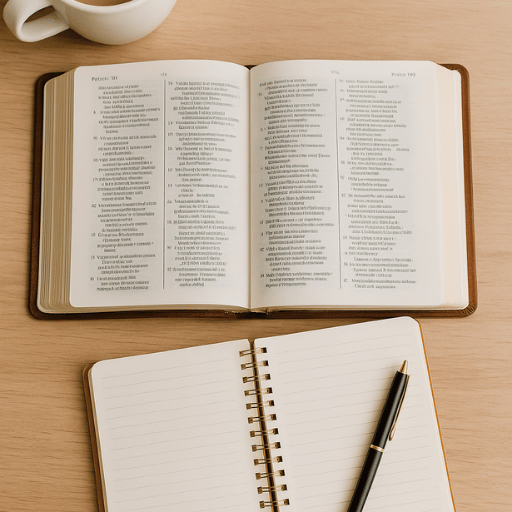When I first picked up my Bible as a new believer, I remember feeling excited — and completely overwhelmed. Where do you even start with a book this big? Should I begin at Genesis? Should I focus only on the New Testament? Or maybe I needed a devotional to guide me?
Maybe you’ve felt the same way. You want to study the Bible, but without a clear plan, it can feel confusing or even discouraging. Friend, I want to encourage you today: studying the Bible doesn’t have to be complicated. With a simple plan, you can take meaningful steps that will draw you closer to God and give you confidence as you grow in His Word.
Let’s walk through how to create a Bible study plan that actually works for beginners — one that is simple, sustainable, and Spirit-filled.
Why Having a Bible Study Plan Matters
Think of your Bible study like a road trip. If you get in the car and just start driving, you may end up somewhere interesting… but without a map, you’ll likely feel lost. A Bible study plan is your map — it keeps you focused, helps you grow consistently, and ensures you’re feeding your soul every day.
Here’s why it’s important:
- It provides direction. You’ll always know where to begin each day.
- It creates consistency. Small, steady habits lead to lifelong spiritual growth.
- It builds deeper understanding. A plan helps you connect passages and see God’s bigger story.
- It keeps you encouraged. When you can look back and see progress, your faith strengthens.
Psalm 119:105 says, “Your word is a lamp to my feet and a light to my path.” A Bible study plan simply helps us walk that path with clarity and confidence.
Step 1: Choose a Time and Place

One of the most common reasons people struggle with Bible study is lack of routine. The best plan in the world won’t help if it’s not part of your daily rhythm.
- Pick a time: Morning works best for many because it sets the tone for the day, but evenings or lunch breaks work too. The key is consistency.
- Pick a place: Create a space where you can be still before the Lord. It could be a quiet chair, your kitchen table, or even your parked car before work.
I often pair my Bible time with my morning coffee. That way, whenever I smell the coffee brewing, I’m reminded: it’s time to sit with Jesus.
Step 2: Decide on a Study Method
There’s no “one-size-fits-all” approach to studying the Bible. What matters is choosing a method that fits your season of life and helps you stay consistent. Here are some beginner-friendly approaches:
- Verse-by-verse study — Take a short passage and reflect deeply on what it teaches.
- Thematic study — Study a topic like forgiveness, faith, or prayer across different books.
- Character study — Follow one person’s story (like Ruth or Paul) and learn from their walk with God.
- Reading plans — Many plans will guide you through books of the Bible in manageable chunks (like reading Psalms in 30 days or a Gospel in a month).
Tip: If you’re brand new, I recommend starting with the Gospel of John. It’s a beautiful introduction to Jesus’ life and teachings.
Step 3: Gather Your Tools

You don’t need a library of resources to get started, but a few tools will help:
- A Bible translation that’s easy to read and understand (NIV, NLT, or ESV are good options).
- A journal or notebook to record thoughts, questions, and prayers.
- Study aids or apps like the YouVersion Bible app or Dwell Bible for listening on the go.
- Printable worksheets — I’ve created free Bible study printables you can download to guide your study.
Remember, the goal isn’t to collect tools — it’s to actually open God’s Word and let Him speak.
Step 4: Set Realistic Goals
One of the biggest mistakes beginners make is aiming too high too soon. You don’t need to study for an hour every day. In fact, starting too big often leads to burnout.
Instead, begin with these simple goals:
- Daily: Read 1 chapter or a short passage and write down one main thought.
- Weekly: Reflect on your notes — what’s the biggest lesson God has shown you?
- Monthly: Memorize one verse that stood out during your study.
Small, steady steps will build a strong foundation of faith.
Step 5: Stay Accountable
Studying the Bible doesn’t have to be a solo journey. In fact, accountability is one of the best ways to stay consistent. Studying the Bible with others can be incredibly encouraging. If you’re thinking about starting your own group, check out my guide on How to Start a Bible Study Group
- Join a small group at your church.
- Ask a friend to study the same passages with you.
- Share your reflections in an online Bible community.
Proverbs 27:17 reminds us, “As iron sharpens iron, so one person sharpens another.”
Overcoming Beginner Struggles
Every beginner faces challenges. Here are some of the most common — and how to overcome them:
- “I don’t have enough time.” Start with just 5 minutes. God can use even the smallest offering.
- “I feel overwhelmed.” Focus on one book or theme at a time instead of jumping all over the Bible.
- “I lose focus easily.” Try writing down your prayers or reading aloud to stay engaged.
- “The Bible feels dry.” Ask the Holy Spirit to guide your study — He is the best teacher.
Friend, don’t let these struggles stop you. Every great habit starts with small steps and persistence.
A Sample Beginner’s Bible Study Plan
Here’s a simple 4-week plan you can try right away:
Week 1: Read Psalm 1–5. Write down one verse or thought each day.
Week 2: Read one chapter of John daily. Reflect on what it teaches you about Jesus.
Week 3: Do a mini character study of Ruth. Write what her faith teaches you.
Week 4: Review your notes and choose one verse to memorize.
This plan is short, doable, and gives you a taste of different study methods.
Encouragement to Begin Today
You don’t need to wait for a “perfect” time to start studying the Bible. There’s no perfect system, no perfect plan. What matters most is simply opening God’s Word and letting Him speak to your heart.
Over time, as you build consistency, you’ll notice something amazing: the Bible will begin to shape the way you think, the way you pray, and the way you live. That’s the power of God’s Word alive in your daily life.
So start small, start today, and trust that the Lord will meet you as you seek Him.
Free Resource: Your Beginner Bible Study Plan
To help you get started, I’ve created a Free Bible Study Plan Printable. It includes a step-by-step guide, journaling prompts, and a 4-week plan to give you structure as you begin.
👉 [Click here to download your Free Bible Study Plan]
FAQ: Creating a Bible Study Plan for Beginners
Q1: Where should a beginner start reading the Bible?
A great place to begin is the Gospel of John. It gives a clear picture of who Jesus is and why He came. The Psalms are also wonderful for encouragement and prayer.
Q2: How much time should I spend on Bible study each day?
Start with 10–15 minutes a day. As your habit grows, you can spend more time, but even a few minutes of focused study can deepen your faith.
Q3: Do I need special tools or books to study the Bible?
No! All you need is a Bible and a willing heart. Journals, apps, and devotionals are helpful, but not required. God’s Word is living and active all on its own.
Q4: What’s the difference between reading the Bible and studying it?
Reading gives you a broad understanding of Scripture, while studying means slowing down, asking questions, and digging deeper into meaning, context, and application. Both are important!
Q5: How do I stay consistent when I feel unmotivated?
Pair your study with a daily routine (like morning coffee), ask a friend to keep you accountable, and remember — persistence matters more than perfection. Keep showing up, and God will meet you there.



